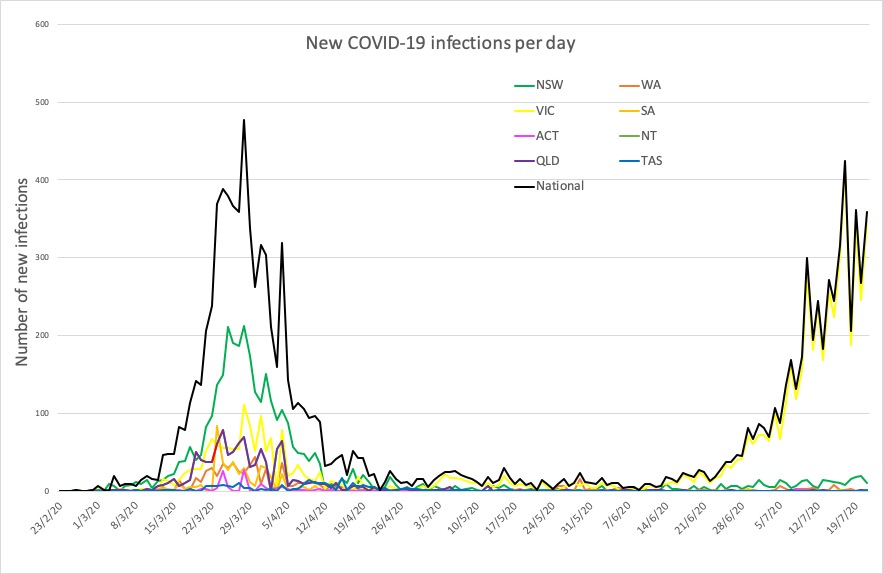Victoria has had another record-breaking day of new cases, with 484 new infections reported today, while a positive case is reported in the Hunter New England area of NSW.
Welcome to The Medical Republic‘s COVID Catch-Up.
It’s the day’s COVID-19 news into one convenient post. Got any tips, comments or feedback? Email me at bianca@biancanogrady.com.
22 July
- Victoria has record-breaking day of new cases.
- US study finds one in five homes unsuitable for self-isolation and quarantine.
- Significant drop in acute coronary syndrome admissions in the UK during pandemic.
- One in twenty paediatric COVID-19 cases in Italy described as severe, but one-third mild.
- Mental distress in adults significantly higher, especially in younger adults, women and parents.
- Outbreaks continue to grow and spread in NSW.
- Victoria has had another record-breaking day of new cases, with 484 new infections reported today. More cases are being reported in aged care facilities in Victoria; the latest being Iris Manor in Ashburton, Mercy Place in Parkville and Epping Gardens Aged Care.
- If you’re wondering how people are supposed to effectively self-isolate at home when they share bathrooms, bedrooms, kitchens and living spaces with other people, you’re not the only one.
Writing in the Annals of Internal Medicine, researchers reported on the feasibility of isolation and quarantine in homes in the US – ranging from stand-alone houses to apartments – and found that it was impossible in more than 20% of homes. That represented around 81 million people – around one-quarter of the population – who would not be able to effectively isolate themselves from others if they or a household member was infected.
To make matters worse, the study found that Native American and Hispanic people were two to three times more likely and Black and Asian people were around 1.7 times more likely to occupy these ‘unsuitable for isolation’ homes.
The authors suggested policymakers consider making use of underutilised hotels and offering these as no-cost accommodation – with medical supervision, free meals, internet and telephone access – to people needing to isolate, particularly those who are unable to effectively isolate at home.
“Similar strategies have been used successfully by several Asian countries and might decrease COVID-19 transmission, particularly in minority communities,” they wrote. “This might reduce medical costs and economic damage from work absenteeism and job loss, as well as the risks to and burdens on many families.”
Meanwhile, the WHO has tweeted advice on how to care for a COVID-19 case at home, including advice on isolation and quarantine measures:
Home care for people with suspected or confirmed #COVID19:
Stay in separate room from others, but if not possible wear a medical mask ? & keep a distance of min. 1 meter (3 feet) from other people. Keep the room well-ventilated & if possible use a dedicated bathroom pic.twitter.com/ZM2dJOLPNe
— World Health Organization (WHO) (@WHO) July 21, 2020
- Another study has highlighted the significant drop in admissions for acute coronary syndromes. This one from the UK, published in The Lancet, found a 40% reduction by the end of March compared to the baseline rate for admissions in 2019. However it also showed a bounce-back during April and May, such that by the last week of May, admissions were only down 16% from baseline.
The study examined data on all patients admitted to 147 NHS hospitals with acute coronary syndromes. It also showed a 23% reduction in STEMI, a 42% reduction in NSTEMI, as well as significantly lower rates of PCI procedures. - Around one-third of paediatric cases of COVID-19 reported in Italy during the pandemic were mild, but just over 13% were hospitalised and around one in twenty cases was described as severe.
A paper published in Pediatrics described 3,836 cases of COVID-19 in individuals aged under 18 years, which made up 1.8% of the total number of cases reported in Italy to May 8. Around 40% of the pediatric cases were in adolescents, with nearly 29% in those aged 7-12 years, 17% in those aged 2-6 years, and nearly 14% in those aged 0-1 year. The hospitalisation rate was highest in those aged under 1 year, 36% of whom were admitted to hospital.
Disease severity decreased with increasing age, after adjusting for factors such as sex, underlying medical conditions, however underlying medical conditions themselves were associated with an increased risk of disease severity. Four children died with COVID, all of whom had pre-existing conditions that the authors said were likely affected by COVID-19 infection. - Adults in the UK are experiencing more mental distress than before the pandemic, particularly younger adults, women, and people with young children. A longitudinal cohort study of more than 17,000 adults, published in The Lancet Psychiatry, found that in the last week of April, more than 27% of participants showed clinically significant levels of mental distress, compared to 18·9% in 2018-19. Levels of distress were significantly higher among participants aged 18-24 years, women, the unemployed, those not living with a partner, and those living with young children.
“The pandemic has brought people’s differing life circumstances into stark contrast: access to outside and inside space, household crowding, lack of school provision and childcare, food insecurity, domestic violence, addiction, access to internet and maintenance of social connectivity, as well as economic reserves are all relevant to mental health,” the authors wrote. - The Hunter New England region of NSW is in the spotlight following confirmation of a case of COVID-19 in Port Stephens, according to a statement from NSW Health. The department is asking anyone who visited the Salamander Bay Shopping Centre or the Windsor Castle Hotel in East Maitland on the 13 or 15 July to self-isolate and get tested for COVID-19.
Clusters continue to grow in NSW; there are now 50 cases associated with the Crossroads Hotel in south-western Sydney, 26 associated with the Thai Rock hotel in the same area, and eight associated with the Batemans Bay Soldiers Club.
Tasmania has recorded its first new case in more than two months, in a traveller who had returned from Victoria and was in hotel quarantine but has since been transferred to hospital.
Here are the latest confirmed COVID-19 infection figures, to 9pm Tuesday:
National – 12,428, with 126 deaths and 183 hospitalised.
ACT – 113
NSW – 3599
NT – 31
QLD – 1072
SA – 444
TAS – 229
VIC – 6289
WA – 651



